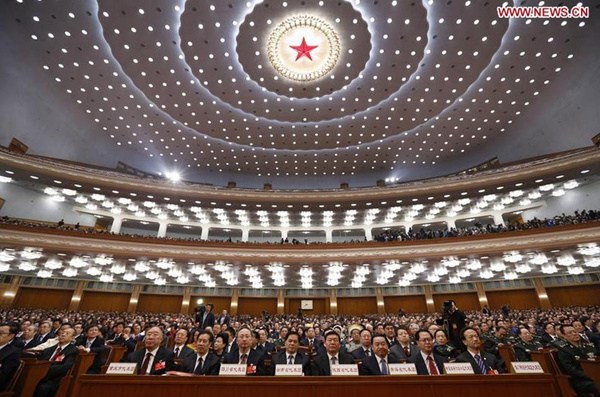
The closing meeting of the fourth session of the 12th National People's Congress is held at the Great Hall of the People in Beijing, capital of China, March 16, 2016. (Photo: Xinhua/Ju Peng)
International observers and experts see a boost for charitable giving in China following the adoption of the country's first Charity Law by the National People's Congress (NPC) -- China's national legislature -- earlier this week.[Special coverage]
The new legislation is seen as timely, too, as the increasingly affluent Chinese wish to make contribution to society even as scandals have eroded public trust in the charity sector in recent years.
"The Charity Law will increase transparency of the activity of charity organizations and help build public trust in them. It reflects the increasingly mature principles and codes of social responsibility, and provides the legal basis for social welfare and justice," said Chun Ka-lim, a professor at Hoseo University, South Korea.
The new law, which came after 10 years in the making, eases restrictions on fundraising by and operation of charity groups, promises tax benefits, and tightens supervision over their governance.
Chun said the legislation is fundamentally an effort to lay the foundation for the growth of the charity sector and help build its reputation, rather than just a move aimed at tidying up the sector.
In a media report, the Wall Street Journal cited experts as saying that it would "fill a legal void" and encourage giving to charities.
"From the philanthropy side and public policy side, it's very well written," the newspaper cited Harvard scholar Edward Cunningham as saying.
The new law provides for regulation over the responsibility of charity groups to disclose information including reasons for raising money.
Andrei Ivanov, a senior fellow at the Moscow State Institute of International Relations, said the adoption of the Charity Law will help curb corruption that may exist in the charity sector.
Richard Musauka, director of Development Partnership International (DPI), a development lobby group in Zambia, said China's new Charity Law is a positive move in the right direction that promotes charity and the spirit of giving and humanity at large.
"We feel that the law is vital because some dubious people the world over have been using charity as a way of attracting resources for themselves," he said.
The charity sector in China has been dogged by scandals in recent years, including one in which blogger Guo Meimei claimed herself to be working with a charity organization and showed off her extravagant lifestyle on social media. The incident exacerbated the distrust in charity groups and caused members of the public and authorities to be more wary of corruption and mismanagement in charity organizations.
Notwithstanding that, annual donations to registered charities in China soared from 10 billion yuan (1.5 billion U.S. dollars) to 100 billion yuan (15 billion U.S. dollars) over the past decade.
Bambang Suryono, president of the Indonesia-based Nanyang ASEAN Foundation, said the new law not only provides legal basis for the philanthropy of individuals and social groups, but also allows the charity sector to play a significant role in China's poverty alleviation drive.
China has set a target of lifting all its impoverished population out of poverty over five years by 2020.
"It means lifting over 1 million people out of poverty per month, which is not an easy job. The development of the charity sector is one of the important ways to reduce poverty. The introduction of the Charity Law will help mobilize resources. It is helpful in China's poverty alleviation and the building of Xiao Kang, or well-off society," Suryono said.
The enactment of the new Charity Law, which is going to take effect on Sept. 1 this year, is another step by China in encouraging the growth of the charity sector and will encourage the growing rich population of China to donate to causes supporting the poor, said Munene Macharia, a scholar at the Nairobi-based United States International University.


















































